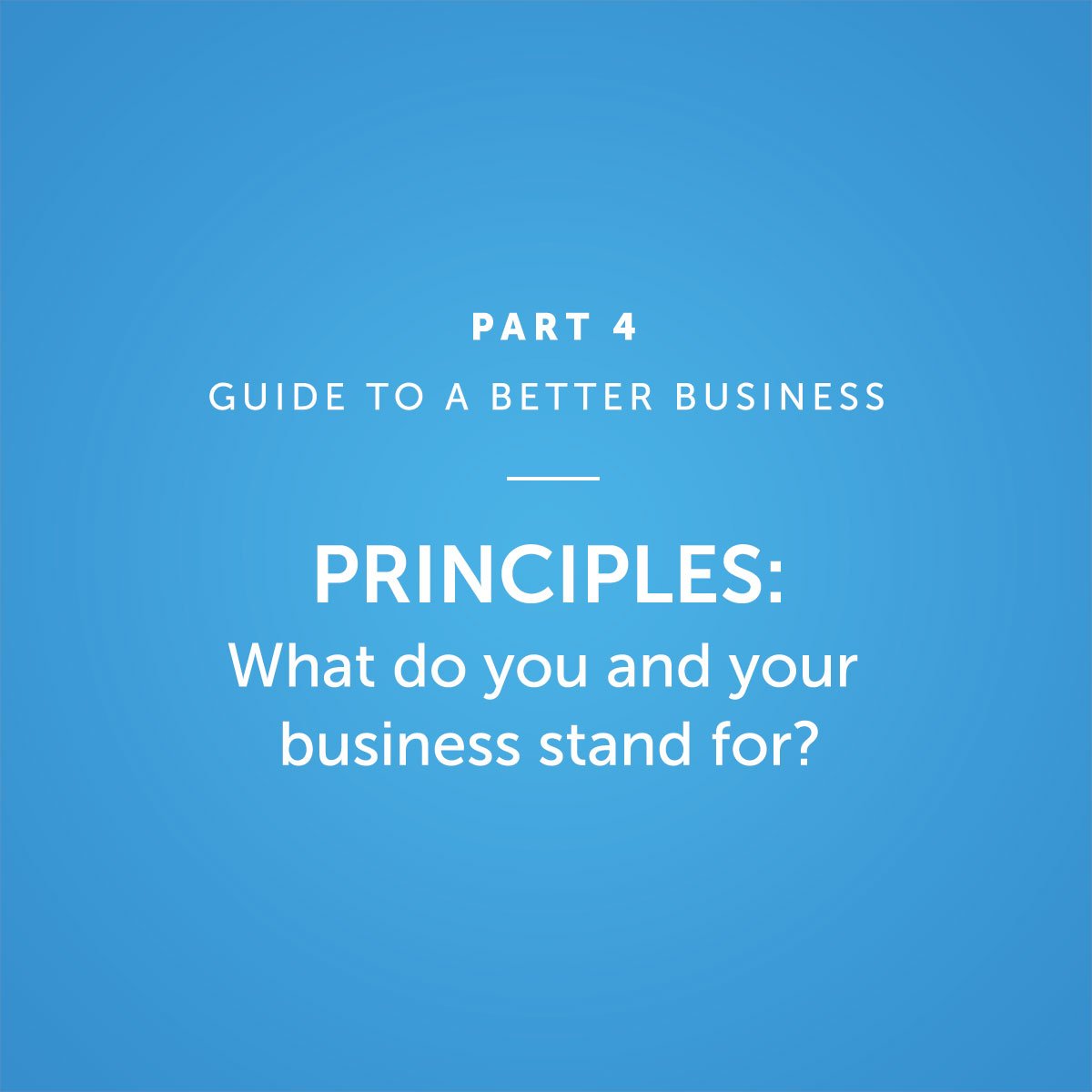PART 4 – GUIDE TO A BETTER BUSINESS
PRINCIPLES:
What do you and your business stand for?
What do you and your business stand for?
C
T
I
O
N
Success, Pupose, Freedom, Fulfilment, Peace
Imagine these two scenarios:
What actions would you take with Sally and Jim?
It largely depends on your principles.
When faced with decisions, most people inherently rely on their own personal principles or core values to decide on the right path to take.
For example, you might believe it’s absolutely fine to make a mistake. But it’s not okay to hide it or to not learn from it.
Therefore, Sally’s actions might be enough to jeopardise her employment or, at the very least, require a formal warning and closer supervision/less independence.
In the second scenario, if workplace culture and teamwork are important to you and you believe that the team must treat one another fairly and honourably, you’d be willing to risk a fallout with Jim in order to address the situation firmly.
In both of these scenarios, your own personal principles guide you.
But your staff won’t necessarily share the same principles as you; and they will also often find themselves in these sorts of decision-making situations.
Your employees need guidelines on how you want them to act with each other and the world. That’s why you need to document your business’s principles.
Why clearly define your principles?
By clearly defining your principles, you will:
- Create less indecision – because you and your team have guidelines to work from.
- Have an opportunity to positively influence the workplace culture in a way that improves productivity and makes it a better place to be.
- Help employees understand what you’re looking for from them.
- Reduce your business risks – for instance with employment law or in dealings with the public.
- Help ensure that your standards are achieved and quality maintained.
- Make it easier to run your business and create a place you’re proud to own.
- Make difficult decisions easier.
- Document your most important organisation-wide learnings, with a view to ensure the same mistakes aren’t repeated.
- Encourage entrepreneurial behaviours among employees that, in other less trusting organisations, could be seen as risky.

Why clearly define your principles?
By clearly defining your principles, you will:
- Create less indecision – because you and your team have guidelines to work from.
- Have an opportunity to positively influence the workplace culture in a way that improves productivity and makes it a better place to be.
- Help employees understand what you’re looking for from them.
- Reduce your business risks – for instance with employment law or in dealings with the public.
- Help ensure that your standards are achieved and quality maintained.
- Make it easier to run your business and create a place you’re proud to own.
- Make difficult decisions easier.
- Document your most important organisation-wide learnings, with a view to ensure the same mistakes aren’t repeated.
- Encourage entrepreneurial behaviours among employees that, in other less trusting organisations, could be seen as risky.
How do you go about defining your principles?
As a business owner, you get to make the rules and that’s one of the most powerful and fulfilling parts of owning a business.
Whatever you really believe is important in life. You’re able to embed this in the basic structure of your business.
Here are some guidelines for defining your principles:
- They should be long-term focussed and will rarely change with your business strategy or type of work. This means that it’s worth taking some time to think about them. Keep in mind, however, that your principles can be a work-in-progress: start with a handful and add to the list as your business develops.
- Once you’ve defined your first set of principles, ask yourself the following:
- Would these principles still be valid in 100 years’ time?
- Would you stick to these principles even if, one day, they disadvantaged you in the short term with your competitors?
- Would you keep these principles even if the business did a 180-degree turn and ventured into completely different activities?
If you answer “yes” to these questions, you’ve defined your principles well.
- Your principles will evolve and should be open to challenge. This doesn’t mean that anyone can change them at will but that the principles can be debated and reshaped, if they need to be made more effective.
- Ensure that you personally follow the principles all of the time. If you appear to have compromised, they’ll be seen as worthless by your employees and then ignored.
- Display your principles in the most appropriate place/s for your business. This might be in staff rooms or back-of-house areas. Don’t be afraid to include them in your marketing messaging.
- Take action against employees who violate the principles, especially if it is flagrantly. You might issue a reminder, then a warning, and finally a termination. Regardless of how good they are at their job, if they’re seen by others to get away with breaking the rules, people will expect the same applies to them.
- Aim to hire employees who share your values from the outset.
- Learn from your mistakes and implement principles that will help prevent the mistakes reoccurring.
- Look for guidance from your employees. Encourage debate amongst your staff on what your principles should be – empowering them to help shape the business.
Now, what does a good set of principles look like?
How do you go about defining your principles?
As a business owner, you get to make the rules and that’s one of the most powerful and fulfilling parts of owning a business.
Whatever you really believe is important in life. You’re able to embed this in the basic structure of your business.
Here are some guidelines for defining your principles:
- They should be long-term focussed and will rarely change with your business strategy or type of work. This means that it’s worth taking some time to think about them. Keep in mind, however, that your principles can be a work-in-progress: start with a handful and add to the list as your business develops.
- Once you’ve defined your first set of principles, ask yourself the following:
- Would these principles still be valid in 100 years’ time?
- Would you stick to these principles even if, one day, they disadvantaged you in the short term with your competitors?
- Would you keep these principles even if the business did a 180-degree turn and ventured into completely different activities?
If you answer “yes” to these questions, you’ve defined your principles well.
- Your principles will evolve and should be open to challenge. This doesn’t mean that anyone can change them at will but that the principles can be debated and reshaped, if they need to be made more effective.
- Ensure that you personally follow the principles all of the time. If you appear to have compromised, they’ll be seen as worthless by your employees and then ignored.
- Display your principles in the most appropriate place/s for your business. This might be in staff rooms or back-of-house areas. Don’t be afraid to include them in your marketing messaging.
- Take action against employees who violate the principles, especially if it is flagrantly. You might issue a reminder, then a warning, and finally a termination. Regardless of how good they are at their job, if they’re seen by others to get away with breaking the rules, people will expect the same applies to them.
- Aim to hire employees who share your values from the outset.
- Learn from your mistakes and implement principles that will help prevent the mistakes reoccurring.
- Look for guidance from your employees. Encourage debate amongst your staff on what your principles should be – empowering them to help shape the business.
Now, what does a good set of principles look like?



Leave A Comment